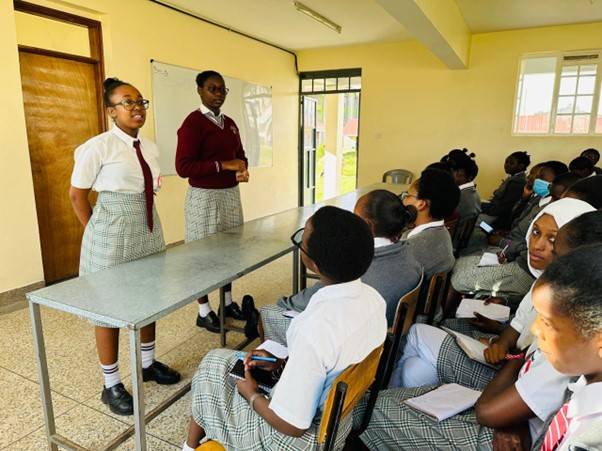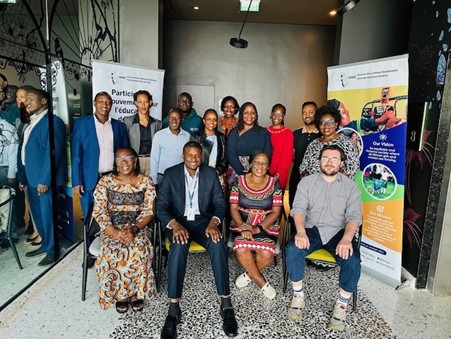
New beginnings – introducing the ‘Tuseme: A voice for Internally Displaced and Refugee Children’ project
Research 29 Nov 2024 7 minute readRefugee and internally displaced communities represent some of the most marginalised groups in the world, facing multiple forms of disadvantage and exclusion that hinder their ability to escape a cycle of poverty and lead economically and socially independent lives. One proven way to break this cycle is through the provision of accessible and affordable quality education.
However, these groups face unique social, cultural, and economic barriers to accessing and engaging in quality education. As such, having the necessary skills and agency to advocate for themselves and their community is essential for members of refugee and Internally Displaced Persons (IDP) communities to thrive. This is especially true for women and girls, considering a significant proportion of refugee camp households are led by single women.

ACER UK has partnered with the Forum for African Women Educationalists (FAWE) and the Higher Education Resource Services – East Africa (HERS-EA) to address these challenges and support the development of agency in girls in refugee and IDP communities in East Africa. As part of a 3-year regional grant from the Global Partnership for Education’s Knowledge and Innovation Exchange (GPE KIX), we will test the scalability of FAWEs Tuseme club in refugee and internally displaced communities in Kenya, Uganda and Ethiopia.
What is the Tuseme club?
Tuseme is Kiswahili for “Let us Speak Out”. It is a gender-focused youth club, which fosters leadership skills and empowerment amongst its members. It takes a student-led approach to address the structural roots of gender inequalities, through the medium of drama, song, and other creative arts. The Tuseme clubs were first established in 1996 by FAWE in Tanzania, to promote women’s rights. Since then, the clubs have demonstrated impact in mainstream school settings and have been expanded across sub-Saharan Africa to benefit more than 80,000 students.
How will we test Tuseme's scalibility?
In order to test Tuseme’s scalability into refugee and IDP communities, the research will take a case study approach over 5 main research phases.
Phase 1: We will first explore Tuseme in mainstream settings where it is currently achieving impact, alongside 2 other FAWE innovations: Centres of Excellence and their gender-responsive pedagogy.
Centres of Excellence is a FAWE intervention that looks at the school holistically, ensuring the necessary physical, social, and academic infrastructure is in place for boys and girls to succeed. Gender-responsive pedagogy is rooted in human rights and aims to support the delivery of teaching and learning that is responsive to the needs of boys and girls. FAWE's model aims to equip teachers with the knowledge, skills, and attitudes needed to promote equal treatment and participation of girls and boys in the classroom and wider school community.
Phase 2: We will conduct a scoping study into refugee and IDP communities the project will work in, to identify the key social dynamics in the communities and any barriers or opportunities for the successful establishment of the clubs.
Phase 3: Triangulate the findings of the first 2 phases and develop a revised Tuseme model.
Phase 4: Deploy and monitor the revised model in refugee and IDP communities.
Phase 5: Evaluate the impact of the revised model.
Where will the project operate?
The project has identified 4 schools in mainstream settings in each country (12 in total) and 4 schools that serve refugee and/or IDP communities in each country (12 in total).
What will the project achieve?
This project is the first step in the long journey to effectively scale the Tuseme innovation into refugee and IDP communities. In the short term, the project will support the children in the communities we are working in to develop their agency and claim their rights. In the medium to longer term, the project will generate evidence on Tuseme’s scalability, which can then be taken forward and further testing, scaling, and community mobilisation can take place. This evidence will be shared through a range of publications and conferences, and crucially a toolkit for other organisations who wish to establish similar empowerment-based initiatives.
What evidence have we collected so far?
The evidence generated at this point in the project has largely been garnered from a literature and policy review. The review has given the project a robust understanding of the education, refugee, and internally displaced person policy environment in Kenya, Uganda and Ethiopia, in addition to highlighting some of the main challenges for people from these communities accessing and remaining in education.
Common challenges for refugee and IDP learners include:
-
Poor quality instruction, due to factors such as underqualified teachers, overcrowded classrooms, and limited teaching and learning resources.
-
Lack of documentation, linguistic ability, and financial and cultural capital can all act as barriers to enrolment in mainstream settings, which is increasingly the policy model adopted to facilitate refugee and IDP education. Geographic separation is also a key factor in limiting refugee inclusion in mainstream national education systems.
-
Teachers in displaced contexts require training to deal with overcrowded, mixed-age or multilingual classrooms. Refugee teachers are often excluded from national training programmes because of professional regulations on right to work, and often only receive sporadic support.
What are the next steps?
ACER UK and its partners will begin data collection for Phases 1 and 2 in the first half of 2025, after the schools return from holidays. To support this, the ACER UK team will meet with partners in Uganda in February to provide a range of capacity building.
If you want to learn more about this project or feel like you could contribute to the emerging knowledge base, please contact the project research lead – Alexander Towne via aceruk@acer.org